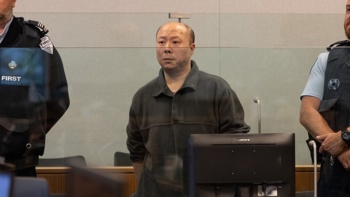
- Mele Hala was sentenced to community detention for a nine-month swindle at Briscoes, totalling $61,164.
- Judge Maria Pecoticemphasised Hala’s breach of trust and denied her request for a discharge without conviction.
- Hala must pay $26,000 in reparations over five years, with a 9pm to 7am curfew over the next six months.
Church youth group volunteer Mele Hala wanted the perfect wedding, and in Tongan culture that meant she had to go lavish - $8000 dress, $15,000 cake, $40,000 for catering, and other, similarly expensive flourishes.
That was the sort of pressure hanging over the former Briscoes employee’s head two years ago when she lost her way, she told authorities recently after pleading guilty to an elaborate nine-month swindle that resulted in the popular retail chain losing tens of thousands of dollars due to fake refund invoices.
“I was desperate, greedy and fearful of losing the relationship,” the 26-year-old Mt Roskill resident explained to a probation officer ahead of her sentencing this week in Waitākere District Court. “I got so greedy. I didn’t stop.”
Now she’s on a Jobseeker benefit, having been fired from Briscoes and forced to leave her subsequent job as an Oranga Tamariki youth worker after she revealed the obtaining by deception charge. But she’s not in jail.
Judge Maria Pecotic ordered the defendant to serve a sentence of electronically monitored community detention — an outcome that allows for an overnight curfew but also leaves the door open for Hala to get a new job so she can start paying back some of the reparations she still owes Briscoes.
The non-custodial outcome was far from an aberration. Community detention was among the most common sentences last year for those convicted of stealing from their employers, according to an Open Justice analysis recently published in the Herald.
But the judge was adamant that the defendant’s discharge without conviction request was a step too far.
“You were in a position of trust with the company,” she explained as Hala stood in the courtroom dock, wiping away tears.
“... Your offending, Ms Hala, was not minor. It was serious, it was carefully planned and occurred over a number of months.”
It’s important, Judge Pecotic said, that prospective employers know of the incident while evaluating whether to put Hala in another position of trust in the future. She explained that such a scheme could have led to “catastrophic consequences” for a business smaller than Briscoes.
$7000 per month siphoned
Hala was employed at Briscoes Westgate in a role that involved handling purchase and refund transactions when she started exploiting the position for personal gain in August 2022, according to court documents.
On 26 separate occasions between then and May the following year she created fraudulent refund transactions - making up names and emails of pretend refund customers then funnelling a total of $61,164 into her own bank account.
When averaged out, that equated to the pilfering of almost $7000 per month before she was caught, the judge noted.
Hala admitted the scheme to her employer and lost her job after the company completed an internal investigation, court documents state. But she declined to make a formal police statement.
She was charged a year later with obtaining by deception.
That charge, along with theft by a person in a special relationship, are among the most common charges for those accused of stealing from their employers. Both carry punishments of up to seven years’ imprisonment.
A recent Open Justice analysis found that theft by a person in a special relationship charges have been dropping over the past five years, from 142 in 2019/20 to 86 last fiscal year.
Of the 57 defendants sentenced last year for theft by a person in a special relationship, just eight cases resulted in imprisonment. Home detention was ordered for 15 defendants, while 19 were ordered to serve community detention and all others were handed less rigorous sentences.
Retail harm
Despite the nation’s economic downturn, Briscoes has fared better than many retailers and even saw expansion on the horizon, the company’s longtime managing director and largest shareholder, Rod Duke, told NZME’s Money Talks Podcast in July.
“We’ve got spectacular staff. We’ve looked after them, all through Covid,” he said. “Look, make no mistake. It is tough. It’s very, very, very tough in the suburb. I’m not going to have a record year in terms of profit, but we’re going to go all right.”
 Briscoes owner Rod Duke at one of his stores in Auckland. Photo / Dean Purcell
Briscoes owner Rod Duke at one of his stores in Auckland. Photo / Dean Purcell
The company’s outlook was a little less rosy on Friday, when Duke announced the group’s full-year net profit after tax was no longer expected to reach the $70 million to $77m target announced in November. Duke blamed a downturn in spending in the crucial Christmas sales quarter but predicted the profit would still exceed $66m.
Meanwhile, many retail businesses have been struggling to stay afloat lately and employee theft “has a big impact”, Retail NZ’s Carolyn Young recently told Open Justice.
Retail NZ encourages all businesses to go to the police if an employee has been caught embezzling but Young acknowledged it can sometimes be a difficult decision when an easier and less embarrassing option might be to quietly usher the person out the door.
“It’s one of those things that makes people feel disappointed and uncomfortable,” she said. “It’s not the sort of thing people like to talk about.
“There’s a lot of shame.”
‘Succumbed to temptation’
No representatives from Briscoes showed up in court this week as Hala was sentenced, and no victim impact statement was submitted.
The courtroom was quiet, aside from courthouse regulars and Hala’s mother, who the court was told had been in the dark about her daughter’s legal issues until recently.
Defence lawyer Jenny Verry said her client had come to court with $2000 that she was able to use as a lump sum reparation payment before paying a further $100 per week.
Police prosecutor Min Lee opposed a discharge without conviction, noting that it hadn’t been a single bad decision.
“The duration of the offending is almost one year, and there appear to be 26 times of offending,” he said, explaining that it speaks to a person’s character when such a crime is committed repeatedly over such a long period.
Judge Pecotic noted that a pre-sentence report prepared ahead of the hearing assessed Hala as presenting a low risk of re-offending and recommended a sentence of supervision without an electronic monitor.
The judge, however, disagreed.
“The case law is fairly clear that it needs to be an electronic sentence,” she said, adding that she also “can’t possibly grant a discharge without conviction”.
To receive such an outcome, the judge would have to determine that the consequences of a conviction would be “out of all proportion” to the gravity of the offence. But Hala’s breach of trust was high, she said.
“You say you are at a disadvantage because you are young and brown,” the judge noted. “There are many women of colour who succeed and do great things ... You did too in your own work environment until you succumbed to temptation.”
Nuptial strain
Hala explained to authorities that she had gotten engaged on New Year’s Day 2022 but her partner then lost his job, putting significant financial pressure on both.
“You believed your impending marriage would be in jeopardy due to financial difficulties,” the judge noted, ticking off the list of expected expenses Hala had estimated for her wedding - a total well over the amount she managed to steal.
“You say you watched other staff members stealing at your job and this is where you got your idea from,” Judge Pecotic noted.
But it should also be noted, the judge said, that Hala and her fiance split in April 2023. The offending didn’t stop until she was caught in May 2023.
“The financial pressures on you for your wedding are really no different from others,” the judge said. “How you chose to deal with it is simply inappropriate.”
 Judge Maria Pecotic, photographed in front of the High Court at Auckland in 2015, before she was appointed judge. Photo / Jason Oxenham
Judge Maria Pecotic, photographed in front of the High Court at Auckland in 2015, before she was appointed judge. Photo / Jason Oxenham
Judge Pecotic set a starting point of two-and-a-half years before allowing 55% in reductions for Hala’s early guilty plea, remorse, personal circumstances, her self-driven effort at rehabilitation that included taking a personal finance course, her volunteer work with the Mormon church and - most importantly, the judge said - her willingness to pay the money back.
She ordered a sentence of six months’ community detention with a 9pm to 7am curfew followed by 12 months of supervision.
The judge limited the total reparation order to $26,000 - to be paid in instalments over five years - because anything higher would be unrealistic given her current job status, the judge said.
But she ended the hearing on a hopeful note, suggesting to Hala that the conviction didn’t have to define her. Hala was described to the judge as a talented singer, active in three choirs, who excelled at working with vulnerable children and adults and aspired to become a music therapist. She had hoped to start university in March.
There are many who go on to succeed, particularly in careers that involve counselling, the judge said. She added: “There are many avenues open to you, even though you have a conviction of this sort.”
Craig Kapitan is an Auckland-based journalist covering courts and justice. He joined the Herald in 2021 and has reported on courts since 2002 in three newsrooms in the US and New Zealand.
Take your Radio, Podcasts and Music with you









